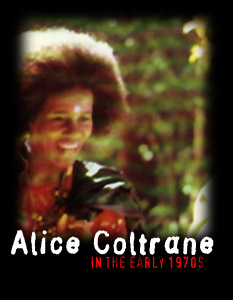
Born Alice MacLeod, Alice Coltrane married John Coltrane in 1965. One of the rare female instrumentalists in jazz, she was also (along with Dorothy Ashby) one of the few harpists in jazz. She performed in the early 1960s with vibist Terry Gibbs, appearing on one of his recordings. Eventually she replaced McCoy Tyner as the Coltrane group's pianist in 1966.
John Coltrane's work became a spiritual wellspring for her, but she surely developed her own style on piano, organ, harp, and later, Indian instruments such as the tamboura. After John Coltrane's death Alice began recording under her own name, like John for Impulse! records. She collaborated numerous times with Pharoah Sanders and Carlos Santana.
Her own recordings started out as small group settings, but eventually added elaborate Stravinsky-esque string orchestrations. She also helped coordinate a number of posthumously released John Coltrane recordings in the early 1970s, especially "Infinity" with its psychedelic kaleidoscope album cover. She recorded her own version of his "A Love Supreme" complete with invocation from her Hindu guru. In the later 1970s her music became highly infused with Hindu religious music, whole sides of her albums being devoted to arrangements of religious chants.

She was a devotee of Swami Satchidananda, and eventually adopted the Hindu name of Turiya. In 1975 she formed the Vedanta Center in California as a center for her spiritual activities. In her spiritual life she is now a devotee of living Hindu saint Satya Sai Baba, and goes by the name Swamini Turiyasangitananda. In the 1980s and 1990s she made a number of recordings of devotional music that are not very widely distributed, but are now listed herein.
She was for a long while the executor of John Coltrane's estate, though her own recording career seems to have ended in the late 1970s. She moved from the Impulse! label to Warner Brothers in the mid-1970s. Eventually control over John Coltrane's still extant recordings passed to her son--himself a wonderful saxophonist--Ravi Coltrane.